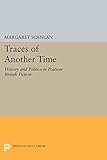Traces of Another Time : History and Politics in Postwar British Fiction / Margaret Scanlan.
Material type: TextSeries: Princeton Legacy Library ; 1069Publisher: Princeton, NJ : Princeton University Press, [2014]Copyright date: ©1990Edition: Course BookDescription: 1 online resource (226 p.)Content type:
TextSeries: Princeton Legacy Library ; 1069Publisher: Princeton, NJ : Princeton University Press, [2014]Copyright date: ©1990Edition: Course BookDescription: 1 online resource (226 p.)Content type: - 9780691605258
- 9781400860937
- 823.91409358 20
- PR888.H5
- online - DeGruyter
- Issued also in print.
| Item type | Current library | Call number | URL | Status | Notes | Barcode | |
|---|---|---|---|---|---|---|---|
 eBook
eBook
|
Biblioteca "Angelicum" Pont. Univ. S.Tommaso d'Aquino Nuvola online | online - DeGruyter (Browse shelf(Opens below)) | Online access | Not for loan (Accesso limitato) | Accesso per gli utenti autorizzati / Access for authorized users | (dgr)9781400860937 |
Frontmatter -- Contents -- Acknowledgments -- Abbreviations -- Introduction -- PART ONE: Troubles in Ireland -- CHAPTER ONE. Iris Murdoch's The Red and the Green -- CHAPTER TWO. Elizabeth Bowen's The Last September and J. G. Farrell's Troubles -- CHAPTER THREE. Northern Ireland in Four Contemporary Novels -- PART TWO: Losing Confidence: Spies and Other Aliens -- CHAPTER FOUR. Philby and His Fictions -- CHAPTER FIVE. Iris Murdoch's Nuns and Soldiers -- PART THREE: Apocalypse -- CHAPTER SIX. Paul Scott's The Raj Quartet -- CHAPTER SEVEN. Doris Lessing's Children of Violence -- CHAPTER EIGHT. Anthony Burgess's The End of the World News -- Afterword -- Bibliography -- Index
restricted access online access with authorization star
http://purl.org/coar/access_right/c_16ec
Is the historical novel the outmoded genre that some people imagine--form inseparable from romanticism, nationalism, and the nineteenth century? In this stimulating volume, Margaret Scanlan answers a convincing "no," as she demonstrates the relevance of historical novels by well-known figures such as Anthony Burgess, John le Carr, Graham Greene, Doris Lessing, Iris Murdoch, and Paul Scott, as well as by less well established writers such as Joseph Hone and Thomas Kilroy. Scanlan shows what a skeptical, experimental approach to the relationship between history and fiction these writers adopt and how radically they depart from the mimetic conventions usually associated with historical novels. Drawing on contemporary historiography and literary theory, Scanlan defines the problem of writing historical fiction at a time when people see the subject of history as fragmentary and uncertain. The writers she discusses avoid the great events of history to concentrate on its margins: what interests them is history as it is experienced, usually reluctantly, by human beings who would rather be doing something else. The first section of the book looks at fictional representations of England's difficult history in Ireland; the second examines spies, aliens, and the loss of public confidence; and the third probes the theme of Apocalypse, nuclear or otherwise, and depicts the collapse of the British Empire as an instance of the greatly diminished importance of Western culture in the world.Originally published in 1990.The Princeton Legacy Library uses the latest print-on-demand technology to again make available previously out-of-print books from the distinguished backlist of Princeton University Press. These editions preserve the original texts of these important books while presenting them in durable paperback and hardcover editions. The goal of the Princeton Legacy Library is to vastly increase access to the rich scholarly heritage found in the thousands of books published by Princeton University Press since its founding in 1905.
Issued also in print.
Mode of access: Internet via World Wide Web.
In English.
Description based on online resource; title from PDF title page (publisher's Web site, viewed 30. Aug 2021)


